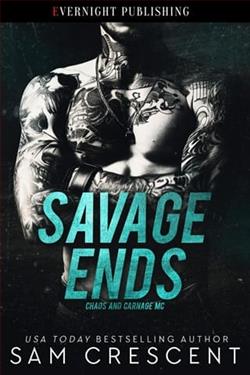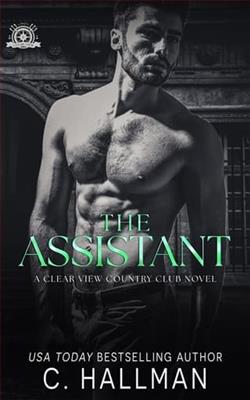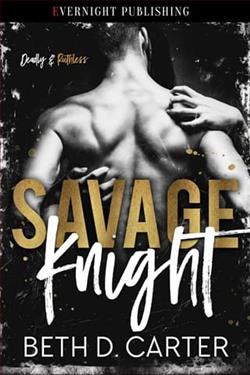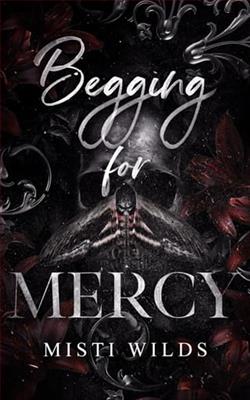Page 43 of Stealing Kisses
“Anemones and roses… You talked about them the other day…when we were working in the garden together.”
“They’re lovely,” she said with her first smile, tiny though it was. “Did you get them from the greenhouse?”
“Yes. But full confession,” Teddy said, raising his hands in surrender. “Maree Davenport did everything else. And if anything is less than perfect, it’s my fault for not successfully following her directions to complete the final touches.”
Then Baylin smiled for real. The thread of hope surged into something much more substantial.
“You have great friends,” he said. “Nosy and pushy, but great.”
Baylin agreed with a song-like laugh. The world looked better and better by the minute.
Teddy smoothed a wave of hair from her face. “You’re stunning,” he said, taking her hand before she could respond and leading her down the hallway and into the kitchen. “I need to put these steaks on the grill. Maree left strict instructions: five minutes on the first side; flip for three more. I’ll be back. Please don’t go anywhere.”
When he returned exactly eight minutes later, soft music played from the kitchen radio, Baylin had poured two glasses of red wine, and she stood at the sink, looking out toward the barn. Teddy set the steaks on a cool burner, pulled the salad from the fridge, and stirred the vegetable hash for good measure.
“I think we’re ready,” he said. Baylin turned away from the window to give Teddy her attention. A tear escaped from the corner of her eye. “Please don’t cry,” he whispered, drying her cheek with his thumb. “I never meant to hurt you. I should’ve made sure you knew what I do, and what that level of publicity means. Honestly, I convinced myself you already knew, giving myself a pass for not telling you straight. It was selfish... I justreallyenjoyed being plain old me for a few days.”
“There’s nothing plain or old about you,” Baylin said with a small smile and a beautiful blush. “It was a misunderstanding. I’m sorry I made such a big deal about it.”
“I’m not.” Teddy spoke before Baylin could shrug off the significance. If she didn’t care about him more than a little, then she wouldn’t have been upset.
“You’re glad I flew off the handle, reprimanded your new pals, and gave you a very immature cold shoulder for the past twenty-four hours?”
“I am,” Teddy said, with a slight cocky smile. He placed a hand on either side of her waist, pulling her closer. “It means I matter to you. And it brought us here…”
Baylin moistened her lips again. And like when she’d done it earlier, Teddy had to rein in the desire he felt for her. There was no doubt of their chemistry; they had it in spades.
Their night was about more.
“To dinner,” he said, grinning down at her. “Let’s eat.”
He’d chosen the small kitchen table over the stately dining room table to keep things cozy. He served dinner buffet-style, so the only things between their plates were their wine glasses, two candlesticks, and the salt and pepper shakers…leaving plenty of room to hold hands.
“Do you mind if I bless the food?” Baylin asked before they began eating.
“I’d like that,” Teddy answered.
“Dear Lord,” she began, bowing her head and closing her eyes. “You don’t make mistakes. You brought Teddy to the farm, opened my heart to his staying here, and made me accept his help this week. My life is better and richer for it. Thank you for that. Please guide us, guard us, and keep us safe…wherever we may go. Amen.”
“Amen,” Teddy echoed.
“Faith was sometimes all we had when I was a kid,” Teddy said, cutting into his steak. The only way forward —together— was to share his past, a past he didn’t talk about often. Not because he was ashamed or because it was tragic, but because it made people feel sorry for him, and he didn’t need nor want pity.
The dinner and all the help from Baylin’s friends were terrific, but telling his story was the grand gesture. He’d decided it last night, staring at the ceiling in the barn apartment, thinking of Baylin in the wee hours of the night. Letting her in was all he could give, and Teddy was determined to give Baylin — and their future — his all.
While they ate, Teddy described the slums where he grew up, on the wrong side of the tracks in a small town outside Baton Rouge, Louisiana. He told her about his parents, who loved him the best they could, but worked way too much for far too little and had little left for a rambunctious son.
Baylin seemed to enjoy his tales of playing street ball with the neighborhood kids every possible moment of the day, and even in the night when they found a park or field with lights. And she laughed outright when he imitated how he’d pronounced his name as a little boy, “Ted G’win, as in, Ted gonna win it all!”
He pointed out good things, too, careful not to paint a one-sided picture of a latchkey kid living a depressing existence on the poor side of town, even if that was most accurate.
“Baseball was your ticket out,” Baylin said.
“And I never looked back.”
“What about your family?”
“They’re good…better, at least. My first Major League contract got them out of debt and into decent housing. They’re proud; it’s a struggle to get them to take what I’d like for them to have. But they let me help support the boys, my two younger brothers.” Teddy smiled, thinking of the two hellions.















